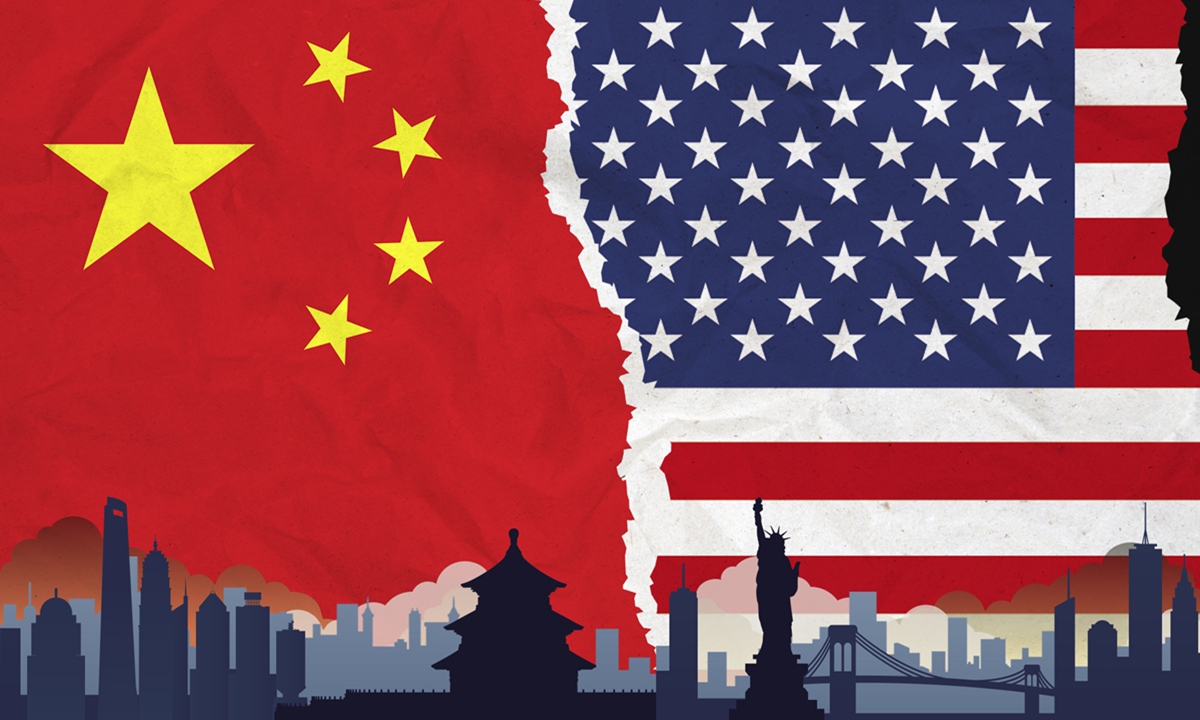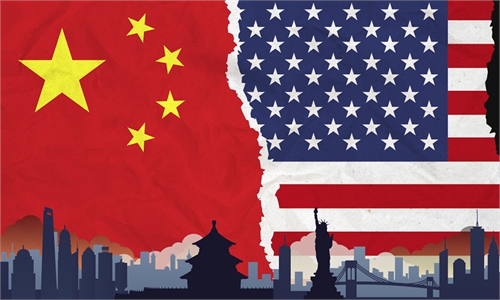Chinese, US defense ministers hold talks; Taiwan question, South China Sea issue remain focus

China-US Graphic: GT
Chinese Defense Minister Dong Jun spoke with US Defense Secretary Lloyd Austin via a video call on Tuesday at the latter's invitation. Dong said that China will never compromise on the Taiwan question and urged the US to recognize China's firm stance, respect China's territorial sovereignty and maritime rights in the South China Sea, according to a handout published by Chinese Ministry of National Defense on Wednesday.
The Taiwan question is at the very core of China's core interests, and it will never be compromised. The PLA will not tolerate any Taiwan secessionists' activities or external support, Dong told Austin via the video call.
The current situation in the South China Sea is generally stable, and regional countries have the willingness, wisdom, and capability to resolve issues. The US should recognize China's firm stance, respect China's territorial sovereignty and maritime rights in the South China Sea, and take practical actions to maintain regional peace and stability and the stability of China-US military relations, Dong said.
The two heads of state are committed to promoting stable and positive bilateral relations. The military field is crucial for implementing the consensus of the leaders, stabilizing the development of the two countries' relations, and preventing major crises, said Dong.
He noted that the Chinese and US militaries should seek ways to coexist, prioritize peace, stability, and trust in their interactions, and build a non-conflict, non-confrontational, open, practical, and gradually trust-building military relationship on the basis of equality and respect. They should truly serve as a stable foundation for the development of bilateral relations.
The two also exchanged views on other topics of mutual concern.
The last time Chinese and US defense ministers held direct communication was when the then Chinese State Councilor and Defense Minister Wei Fenghe and Austin met on the sidelines of the 19th Shangri-La Dialogue in Singapore in 2022.
The conference between two defense ministers came after a joint statement issued by the leaders of US, Japan and the Philippines which voiced "serious concern" over China's actions in the South China Sea, slamming its behavior as "dangerous and aggressive." The statement also emphasized that peace and stability across the Taiwan Straits was vital and indispensable to global security and prosperity.
The US, Japan, Australia and the Philippines also held a joint maritime exercise in the South China Sea earlier this month.
Li Haidong, a professor at the China Foreign Affairs University, told the Global Times that the conversation occurred at a crucial juncture when the US has been engaging in a series of actions to strengthen alliances with countries such as Japan and the Philippines. Their activities are all focused on creating turmoil and friction in the South China Sea and the Taiwan Straits, posing a threat to China's core interests. There is now a possibility of unexpected incidents arising in the handling of these issues, said Li.
This phone call carried great symbolic significance, as it marked the resumption of military communication channels between the two countries, said Li, noting that military relations are an important dimension of the China-US relationship, and there is indeed a need for both sides to strengthen communication and exchanges in military relations.
However, Chinese observers doubted whether the call would help de-escalate the regional tension as the US intends to create crisis in South China Sea and Taiwan Straits to strengthen its control and dominance over its allies.
By pretending to seek negotiation with China on military level, the US wants to create an illusion to the outside world that Washington is responsible for managing and controlling the conflicts with China, said Li, adding that the US move may pave way for greater levels of frictions in this region.
If the US is sincere, it should not hype up the Taiwan question and South China Sea issue during leaders' summit between US, Japan and Philippines in Washington. Therefore, although the US has a sense of responsibility in its words, its actions are without a bottom line and lack responsibility. This hypocrisy and duplicity indicate the complexity of future interactions between China and the US, Li noted.


